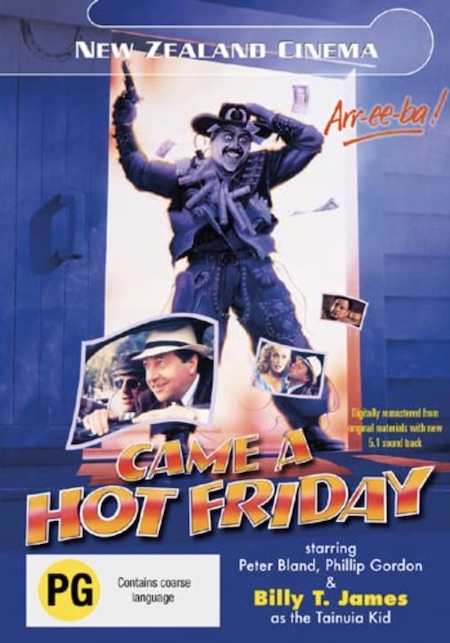

Mirage Film Productions in association with New Zealand Film Commission. © 1984. Budget approx. $2.2 million. Locations: Wanganui, Waiuku, Whangaehu River. Distributor. Mirage Film Productions. Rating: GY, September 1984. 35 mm. Dolby stereo. Colour. 102.5 mins. Director. Ian Mune. Producer. Larry Parr. Screenplay: Dean Parker, Ian Mune. Source: Ronald Hugh Morrieson's novel, Came a Hot Friday. Director of photography: Alun Bollinger. Camera operator: Paul Leach. Editor: Ken Zemke. Production designer: Ron Highfield. Costume designer: Barbara Darragh. Musical director/composer: Steven McCurdy. Vocals: Beaver, Prince Tui Teka. Sound: Hammond Peek, Greg Bell, Finola Dwyer, Brian Shennan, John Lipke.
Cast
Peter Bland (Wes Pennington), Phillip Gordon (Cyril Kidman), Michael Lawrence (Don Jackson), Billy T. James (Tainuia Kid), Marshall Napier (Sel Bishop), Don Selwyn (Cray), Marise Wipani (Esmerelda), Erna Larsen (Dinah), Phillip Holder (Dick), Tricia Phillips (Claire), Bruce Allpress (Don’s Dad), Michael Morrissey (Morrie), Roy Billing (Darkie Benson), Hemi Rapata (Kohi), Bridget Armstrong (Aunt Agg), Stephen Tozer (Cop), Duncan Smith (commercial traveller), Leslie Gregory (New Plymouth bookie), Alistair Douglas (Vicar), Peter Rowley (barman), Trudy Olson (dance girl), Derek Hardwick (Capstan), Gaylene Wright (balcony girl), Francis Cullenberg (Pop Simon), with lan Watkin, Norm Keesing, Sean Duffy, Richard Stevenson.
New Zealand, 1949. City conman Wes and his sidekick Cyril are discovered running a horse-racing betting scam. Turning up on the Friday of Anzac weekend in Tainuia Junction, they dragoon local innocent, Don, into joining their con. Meanwhile gambling den proprietor Sel Bishop, in an insurance fraud, orders his lover Claire’s brother, Morrie, to burn down the local billiard saloon and the old man living there dies. In a third storyline the Tainuia Kid, a Maori who thinks he’s a Mexican bandito/Zorro cross, drives Sel to homicidal mania by letting down his tyres. After Don wins a thousand pounds off him in the pub, bookie Norm goes after the trio at Sel Bishop's Saturday night party. In an eventful night Don loses his virginity and Wes wins a thousand pounds, only to lose it when a cop breaks up the party. Wes, Cyril and the Tainuia Kid join forces against Norm and Sel. The climax sees Sel burned to death, Norm tipped into the river, Wes and Cyril parted then reunited and the Tainuia Kid throwing Wes’s money to an imagined Taniwha. At the denouement, Wes and Cyril pull up outside the town cenotaph where residents, gathered to remember the war dead, turn their backs on the troublesome pair. Watched wistfully by Don, Wes and Cyril speed towards Napier in search of their next scam.
Came a Hot Friday is a sprawling, rollicking tale in the spirit of the Ealing comedies. It is without the source novel’s sexual perversion and sadistic violence and rejoices in its larger-than-life, parodic characters. Good-natured, nostalgic fun is made of small town 1940s New Zealand where Friday night’s excitement is a pie and chips at the boozer. The cinematography is excellent and the plot rich in detail, with the minor characters’ eccentricities adding to the fun. The pace, ably aided by tight editing and an upbeat 1940s musical score, never flags. Much of the humour’s success results from the comic timing of the actors, who were encouraged to improvise. Crime itself is a joke because the aims are bunglers while the only vicious one, Sel, gets his just desserts. Ironically the con men, for all their sophistication, are the eventual losers, outclassed by the local ‘fools’ — Don gets Esmerelda and the Tainuia Kid gets a horse.
Slapstick, knockabout, running gags (shirtless Cyril shooting his cuffs, Wes jamming his finger), sight gags, irony and puns pepper the narrative which, while driven by crime, has mateship as its thematic glue. Wes and Cyril regard females as necessary for sport and pornographic pictures as a useful aid to masturbation, but their deepest felt emotions are those they feel for each other. Like antipodean Marx brothers, shrewd, grandiloquent Wes and naive, American-obsessed Cyril are a brilliant, unforgettable pair.
While British reviewers described the film as ‘likeable’ and ‘amiable’, Tom McWilliams’s comment in The Listener (31 August 1985) that Came a Hot Friday was a ‘fresh, funny, exuberant, childlike hoot of a film’ exemplified the enthusiasm of local reviewers and audiences, who welcomed it as a ‘Kiwi classic.’ HM
1986 Melbourne Film Festival: One of the Ten Best.
New Zealand Listener Film and Television Awards: Best Adaptation. Best Director. Best Editing. Best Film. Best Film Score. Best Male Performance, Peter Bland. Best Male Performance in a Supporting Role, Billy T. James.
Source: Martin, Helen & Sam Edwards 1997, New Zealand Film 1912-1996, OUP, Auckland: 103.
Garry Gillard | New: 20 February, 2013 | Now: 5 May, 2022